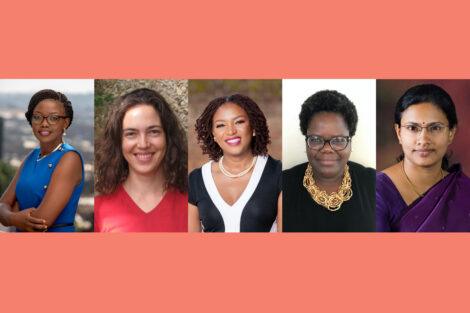February 25, 2022 – Bridget Malewezi is committed to ensuring that people have access to credible and reliable health information—particularly in the COVID era.
A doctor and public health practitioner from Malawi, Malewezi has spent a decade as a health columnist for Malawi news outlets, and also offers health advice as “Dr B on Health” on social media platforms. She is one of five members of the 2021 cohort of the Jane Jie Sun Harvard LEAD Fellowship, which aims to equip and empower women from low- and middle-income countries for global health leadership roles. The hope is that these women will, in turn, mentor future female leaders in global health.
The Fellowship, offered by the Harvard Global Health Institute (HGHI) and the Women and Health Initiative (W&HI) at Harvard T.H. Chan School of Public Health, was launched in 2019 with the support of Jane Jie Sun, CEO of Trip.com group.
“Women are underrepresented in global health leadership positions,” said Ana Langer, professor of the practice of public health at Harvard Chan School, who leads the W&HI. Langer co-manages the Fellowship with HGHI and mentors some of the fellows. “They have huge untapped potential. With just a little support and the opportunity to learn and collaborate over the course of a year they can thrive and become so much more influential and capable of bringing change to different fields they’re working in.”
The LEAD Fellowship is aimed at mid-career women leaders who’ve already made significant contributions in their home countries, and in some cases globally, and who exhibit the potential to achieve more, said Langer. The Fellows take courses across Harvard on subjects such as leading change, economic justice, and global health delivery; attend workshops to build skills in areas including public speaking, self-promotion, and negotiation; work one-on-one with mentors; give talks; and share experiences with each other.
“The idea is to give them the opportunity to reflect on what they’ve done so far, to work on new projects, to connect and network with like-minded individuals at Harvard and beyond, to take classes, to participate in seminars, and to be paired with mentors,” said Langer.
Previous LEAD Fellows have made notable strides, Langer said. For example, Stela Bivol of Moldova, a member of the 2019 cohort, went from directing a nonprofit focused on disease response and health systems strengthening in Eastern Europe to a new role with the World Health Organization, serving as a strategic adviser on infectious diseases for that region. Another member of the 2019 cohort, Shabnum Sarfraz, had already held high-level positions in the Pakistani government—including leading a health care reform effort in the province of Punjab—and, after the Fellowship, was promoted to a broader national role overseeing a range of sectors, including health, education, and social welfare.
In addition to Malewezi, fellows in the 2021 LEAD Fellowship cohort include Mareli Claasens, a clinical epidemiologist from Namibia who has focused on taming tuberculosis; Preethi John, a health and development management professional from India who is currently the director of the Chitkara Global Health Institute; Alice Kayongo, a public health practitioner and human rights advocate from Uganda who serves as senior policy adviser for WACI Health, an organization that advocates for equitable access to health care for all in Africa; and Julieta Kavetuna, a mental health specialist with the Public Health Institute of Namibia and a member of Namibia’s Parliament.
Malewezi said she is relishing the opportunity to connect with others in the Harvard community who are doing similar work as her. And Kavetuna, who said she appreciates learning from experts across the University, noted, “I believe that, with every opportunity presented to me, I should grab it with both hands and make the best of it. When I saw this opportunity [to participate in the Fellowship], the fact that it was about women and health inspired me more than ever.”
Although so far this year’s LEAD Fellows have had to participate remotely because of the pandemic, the plan is to bring them to campus for two weeks in May to take a class and speak at upcoming events, Langer said.
This year’s Fellows are already getting noticed, she said. After John gave a well-received talk last November about human resources gaps faced by India as it works to achieve universal health coverage, she got invited by Vikram Patel, professor in the Department of Global Health and Population and co-chair of the Lancet Commission on global mental health and sustainable development, to join the commission. Said Langer, “That’s a great example of the connections people can make.”
She added, “I really love this program. It’s making a difference.”
